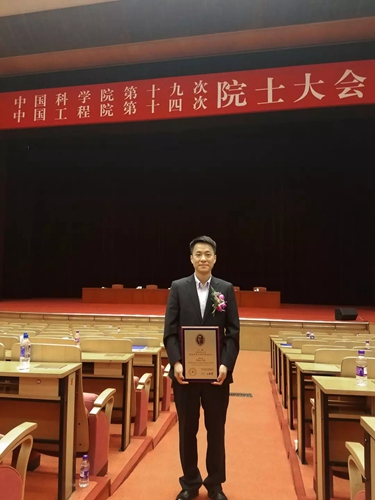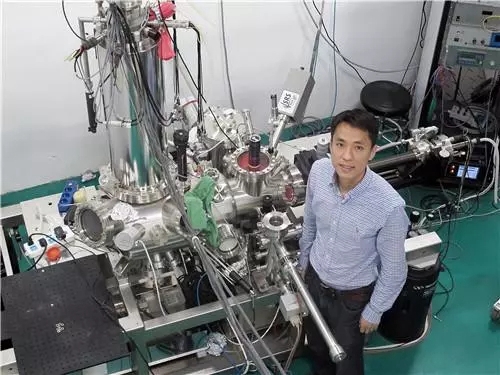Peking University, June 2, 2018: On the afternoon of May 30th, 2018 Tan Kah Kee Science Awards and Tan Kah Kee Young Scientist Awards were published. Six research programs and six young scientists were awarded this year. Professor Jiang Ying from International Center for Quantum Materials, Peking University, won the Tan Kah Kee Young Scientist Award for mathematics and physics.

Professor Jiang Ying
A Brief Introduction of Professor Jiang Ying
Jiang Ying, born in Le Shan, Sichuan Province in 1982, is currently a professor in International Center for Quantum Materials, Peking University. He obtained his Bachelor degree in Physics at Beijing Normal University in 2003 and his Doctor degree at in 2008. He visited Forschung szentrum Julich, Germany as a research scholar during 2006-2007 and received post-doctoral training at UC Irvine during 2008-2010. He returned to China in 2010 as an assistant professor at Peking University. He was promoted to a tenured associate professor in 2016 and a tenured professor in 2018.

Professor Jiang Ying in his lab
Professor Jiang Ying mainly focuses on condensed matter physics and Physical Chemistry. He pays special attention on the atomic-scale properties and ultrafast dynamics in single molecules and low-dimensional materials.
Recently, Jiang Ying has developed a high-resolution scanning probe microimaging and spectroscopy technique, and makes huge breakthrough in precise detection and manipulation of single quantum states. In particular, the spatial imaging and precise positioning of hydrogen atoms are realized and the nuclear quantum effect of water is revealed at the atomic scale for the first time.
Professor Jiang Ying has published more than 30 high-quality papers, including 2 in Science, 1 in Nature, 6 in Nature Journals ((Nat. Mat., Nat. Phys., Nat. Chem., etc)). He has been invited to give plenary lectures in international conferences for more than 40 times. He has been enrolled in the editing committee for Chemical Physics, Advanced Quantum Technologies, etc. He is a member of the Chinese Advisory Committee of the American Federation of Physics, Director of the China Youth Science and Technology Association.
Professor Jiang Ying has been named a number of international and national academic honors and awards, including Outstanding Young Scientist (2012), IOP-JPhys Emerging Leaders (2016), The national youth talent support program (2016), Changjiang Young Scholars Programme of China (2017), National Science Foundation for Distinguished Young Scholars (2017). His research work has been selected as Top-ten Progresses of Science and Technology of China (2016) and Top-ten Progresses of Basic Research of China (2017).
Investigation and manipulation of full quantum effects of light element systems
For most of quantum materials, their properties are dictated by the quantum behavior of electrons, while the nuclei are only treated as classical particles. However, light nuclei like H+ (proton) can exhibit prominent quantum effects due to the small mass, in terms of tunneling and zero-point motion. The so-called nuclear quantum effects (NQEs) are responsible for many abnormal properties of light-element materials such as water. Unfortunately, the accurate and quantitative description of NQEs is very challenging due to the lack of atomic-scale experimental techniques. Ying Jiang and coworkers developed state-of-art scanning probe microscopy/spectroscopy, which allows the access to the quantum degree of freedom of protons with atomic precision. With such a new technique, they achieved submolecular-resolution imaging of water molecules and directly visualized the concerted proton tunneling in water clusters. Furthermore, they unraveled quantitatively, for the first time, the quantum component of single hydrogen bonds and proposed a general picture that the zero-point motion of protons weakens the weak hydrogen bonds but strengthens the relatively strong ones. Those findings may completely revamp our understanding of water and other light-element materials from a full quantum perspective. This work also provides new dimensions to manipulate the quantum properties and opens up a new frontier of condensed matter physics.
Written by: Li Haiyue
Edited by: Fu Wenyun

